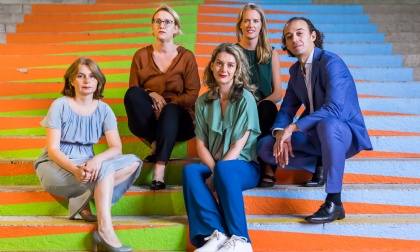 |
| Editor’s Note |
|
The compositions of native Viennese Thomas Wally (1981), which the fabled Mondrian Ensemble have so marvelously put down on this, the composer’s first portrait recording, might just be considered the dawn of the latest in new music. We can marvel at the unique language and character in Wally’s works from the last ten years – among them two piano quartets, a string trio, and a 15-minute long piece for solo violin – and at his keen desire for experimentation and liberty which he combines with the utmost of conceptual seriousness. We can hear playful curiosity and profound knowledge at work in these compositions, seamlessly conjoined. A wealth of detail and vision; poetry coupled with absolute clarity. In that sense, and many others, Thomas Wally’s music is “visceral; even displaying a downright haptic quality”, as his renown Swiss colleague Dieter Ammann lauds Wally’s music in the liner notes. |
 |
| Lineup |
|
MONDRIAN ENSEMBLE
Ivana Pristašová, violin
Petra Ackermann, viola
Karolina Öhman, violoncello
Tamriko Kordzaia, piano
Thomas Wally, violin (tracks 2, 4, 6, 8) |
 |
| First Listener’s Note |
|
[…] Wally has an innate sense for dramatic trajectories throughout; ditto for proportions, for the pliability of individual musical ideas ... in short: for shaping time with sound. All the works on this disc have another thing in common: beneath the surface, vividly shaped by often powerful gestures – that layer of primary, principally audible information – hides a carefully assembled wealth of ideas. It is an artful, but never artificial music. It allows for many things, without ever becoming indiscriminate. Wally himself speaks of composing as “hard work”, but he also mentions the “almost childlike joy of playing with the material; an ultimately very positive underlying emotion.”
His music allows us to experience both and, depending on your subjective response to it, dear listener, probably much more still. You might, therefore, want to lend your ears to these recordings not just for a first listening, but several repeat listenings. You will not regret it! |
 |
| Artist’s Note |
|
 |
|
| © Markus Sepperer |
|
To call the recording at hand a life-time project would be a bit far-fetched. But it certainly is the project of a decade, in more than one way. For one, there are the compositions that are included on it, which span roughly ten years, from transfigurations for piano quintet, which was premiered at the 2008 Bregenz Festival, to my second piano quartet, Les îles des nombres III (2 × 12 × 12 × 4). Further, this recording was made almost exactly ten years after I first got in touch with col legno. And finally, there is an element to this recording that tells of a friendship that began a little over ten years ago in Vienna and extends now to the whole Mondrian Ensemble. [...]
|
1CD | Instrumental | Ensemble | PRIME colors Edition | Contemporary |
|
 |
 |
| Recommendation |
|
|
|
|
"Six Melodies" (1950) and "Thirteen Harmonies" (1985): Annelie Gahl (violin), Klaus Lang (Fender Rhodes) and col legno present an excitingly accessible John Cage.  |
 |
|
|
|
|
Klangforum Wien presents works by the (almost) forgotten composer Lucia Dlugeoszewski.  |
 |
|
|
|
|
Almost in G: an album composed by Christian Winther Christensen, performed by Scenatet and sincerely recommended by col legno!  |
 |
|


